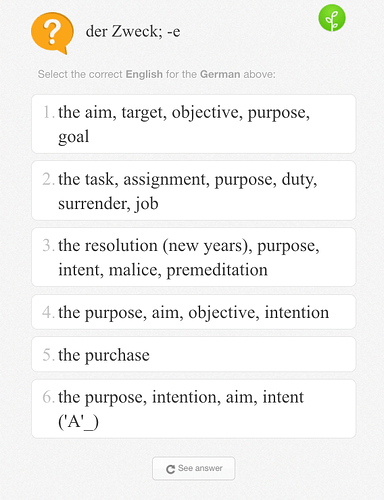Hello @dylan.nicholson.548
Another minor issue that could be improved is where the prompt does not contain the definite article “the”, but the answer requires it. Some examples are:
der Schluss, prompt: “Conclusion, end, ending, closure, close”
die Nähe, prompt: “proximity, vicinity, closeness”
der Dummkopf, prompt: “dumb person, idiot”
der Zufall, prompt: “Coincidence, accident, fluke, chance occurrence”
die Nähe, prompt: “Proximity…”
Different items:
Level 80, “die Spitze” - it is kind of surprising to see only “lace” as the acceptable translation of this.
Level 81, “der Wissenschaftler” - only accepted answer is “academic” although I would have thought that “scientist” was more common.
Level 82, “die Leiter” appears twice in the word list. (Incidentally, this list only has 14 words, including the duplicate, unlike the usual 15 in this course.)
Level 84, “wachsen” - should “anwachsen” be accepted (or not rejected…)?
Level 86, “derjenige” - the prompt is “that (one), the (one) (‘d_’)”, but it seems to me that there are other potential answers beginning with ‘d’.
As I have said in a previous post, the whole question on synonyms is very thorny, and synonyms very seldom have an identical meaning. I think that previous contributors to this course have been assuming that there is some differentiation in their prompt which makes it clear what answer to give, but the average learner can get confused at times.
For example, in level 85, in the tapping test to match English to the German word “rechtzeitig”, the correct option to type is “on time (punctual), in time (to accomplish sth)”. However sometimes a second option of “punctual, on time” is presented (which probably comes from “pünktlich”) and tapping is this answer is judged wrong.
A particularly egregious example is on level 90, with the tapping options to match the German word “der Zweck”. Three options which are very similar are presented, but only one is judged to be correct. See screenshot:
I notice that in the case of some words, when they are first presented some German synonyms are shown directly below the main word, in smaller letters. Can we add synonyms to the course in this way? (However, I don’t think that the synonyms are shown during tests.)
It is useful that some words now have the German synonym in the English alternates column, but it is quite confusing to be told that you’ve typed the word in English when in fact you have typed an alternative German word. I think that it would be a lot better to guide people to enter only the acceptable word, so I am in favour of having additional hints within the prompt - if there is not a more complete solution to the problem.

 (the end justifies the means)
(the end justifies the means) Can you put it somewhere else where Dylan will see it?
Can you put it somewhere else where Dylan will see it? so I started to look for phrases that would help me score better and be less frustrated whilst going through my memrise vocab.
so I started to look for phrases that would help me score better and be less frustrated whilst going through my memrise vocab.